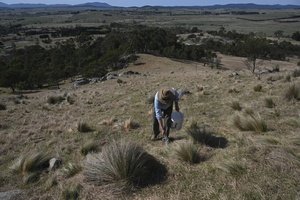MELBOURNE - The concept of permaculture was developed around fifty years ago in the mid-1970s. It’s a fascinating and widespread approach to designing sustainable human settlements.
Permaculture involves cultivation, food production, construction and even social relationships, affecting many aspects of people’s lives.
According to the philosophy behind this approach, each permaculture project should be based on three fundamental principles: care for the earth (referring to both the soil and the planet as a whole), care for people and sharing any surplus, all the while limiting consumption.
In Blampied, about an hour and a half from central Melbourne, this lifestyle has been embraced by Mara Ripani, who, together with her family, manages Village Dreaming.
Village Dreaming is a place where permaculture principles are applied harmoniously and expertly, thanks to Ripani and her partner Ralf’s experience.
Ripani, who came to Australia from Civitanova, Marche, in 1981 when she was nine, had her love for gardening and cultivating the land instilled in her from a young age by her parents, who tended to a garden throughout their lives.
“It’s always been natural for me to have plants. Even when I was renting, I would plant something in the garden,” Ripani shared.
She grew up in Ballarat before moving to Melbourne for university where she graduated in Social Science and Environmental Conservation.
After working for various non-profit organisations including the Alternative Technology Association and CERES Community Environment Park, Ripani served for five years as a Climate Change Education Officer for local government bodies, educating the public about the dangers of climate change and suggesting lifestyle changes that can be adopted by individuals to reverse the trend.
Her journey ultimately led her to leave the city for the countryside together with her family. In Blampied, Ripani has realised her dream: 15 acres of land “where I will never stop planting”.
Dreaming Village was born from Ripani’s desire to find a place where “there is enough space to grow fruits and vegetables and live immersed in nature” and where a house could be built to integrate seamlessly with that nature.
“We designed the house we live in following an innovative construction method [called] ‘passive solar design’, which requires less energy consumption,” explained Ripani, who has posted a series of tips and other information on her website for those who are looking to make the same changes.
When they first purchased the land, Ripani and her husband realised that many of the trees on the property had been cut down.
“We decided to repopulate the space with native trees and plants, which also serve as a cooling system for us,” she said. “We planted enough to have as much shade as possible, considering the rising temperatures.”
Ripani divides her time between caring for plants and animals—they have pigs and chickens—and running a cooking school.
She organises various workshops where guests have the option to stay in one of the two available rooms on the property. Ripani teaches them how to make bread, pasta, preserves and even salami. During the autumn months, people can learn how to prepare a whole meal with mostly chestnuts.
Guests can also visit the garden where “only natural fertilisers are used” and appreciate the variety of vegetables and aromatic plants grown.
“Compared to before,” she said, “my life hasn’t changed much because my passion for the garden and plants has remained the same.
“The only big difference is the space. Where I used to plant one tree, now I plant a thousand.”
Many who dedicate themselves to gardening often say that taking care of plants is rewarding and brings them a sense of well-being, and Mara Ripani is no exception.
“Working in the garden has always been a source of great satisfaction,” she shared.
“It makes me feel at peace with the world. Where there is a flourishing garden, there are usually people thriving as well.”












